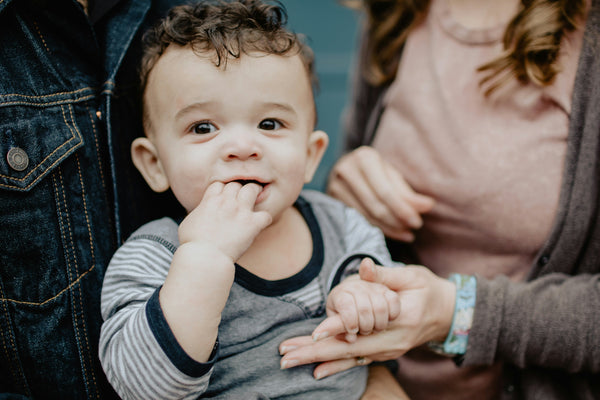Nighttime Pooping & What It Says About Your Kid’s Gut Health
share this article
 Most kids have predictable poop patterns, usually going in the morning or after meals. But when your kiddo wakes up at night needing to poop, it could be a sign that something is off with their gut health.
Most kids have predictable poop patterns, usually going in the morning or after meals. But when your kiddo wakes up at night needing to poop, it could be a sign that something is off with their gut health.
Occasional nighttime pooping isn’t always a concern, but if it happens frequently, it may indicate digestive imbalances, food sensitivities, or gut irritation.
Here’s what parents need to know about why kids poop at night, what it could mean, and how to fix it.
Why Is Your Kid Pooping at Night?
Nighttime pooping is not common in healthy kids. The digestive system naturally slows down at night, and the body prioritizes rest and repair over digestion.
When your kiddo regularly wakes up needing to poop, it could be due to:
- Gut Imbalances & Irritation – Disruptions in gut bacteria (dysbiosis) can cause nighttime digestive discomfort.
- Food Sensitivities & Triggers – Certain foods (like dairy, gluten, or high-oxalate foods) may cause delayed digestion and irritation.
- Poor Digestion Before Bed – Eating too close to bedtime may lead to undigested food triggering late-night bowel movements.
- Stress or Nervous System Activation – Anxiety and stress can stimulate the gut and trigger a bowel movement at night.
- Constipation & Buildup – If your kiddo is backed up during the day, the body may force a late-night release.
Begin Health Expert Tip: If nighttime pooping happens occasionally, it’s probably nothing to worry about. But if it happens regularly, a deeper gut health issue might be at play.
What Nighttime Pooping Could Mean About Your Kid’s Gut Health
1. Gut Microbiome Imbalance (Dysbiosis)
A balanced gut has good bacteria that regulate digestion. If bad bacteria overgrow, it can lead to irregular bowel movements, nighttime pooping, and gas.
Signs of Gut Imbalance in Kids:
-
Frequent tummy aches, gas, or bloating.
-
Sudden poop urgency, especially at night.
-
Loose stools alternating with constipation.
How to Fix It:
Add prebiotic-rich foods (bananas, asparagus, chicory root).
Give kid-safe probiotics to restore gut balance.
Reduce processed foods & high-sugar snacks, which feed bad bacteria.
2. Food Sensitivities or Gut Inflammation
Some foods cause delayed gut irritation, meaning symptoms show up hours after eating, which is why nighttime pooping may occur.
Common Food Triggers:
-
Dairy (lactose intolerance or dairy sensitivity).
-
Gluten (for kids with gluten sensitivity or celiac).
-
High-oxalate foods (spinach, almonds, sweet potatoes).
-
Excess fruit or fructose (apples, pears, juice before bed).
How to Fix It:
Keep a food journal to identify triggers.
Remove suspected problem foods for 2–4 weeks and track changes.
Try gut-healing foods (bone broth, fermented foods, HMOs).
3. Eating Too Close to Bedtime
Eating too late can disrupt digestion, especially if meals are too heavy, high in fiber, or rich in fat.
Signs Late Eating Is a Problem:
-
Your kiddo eats within 30–60 minutes before bed.
-
They experience stomach cramps or discomfort before falling asleep.
-
Pooping happens within 4–6 hours of eating a large meal.
How to Fix It:
Give dinner at least 2 hours before bedtime.
Avoid heavy, greasy, or fiber-packed foods right before sleep.
Encourage gentle digestion with chamomile tea or a belly massage.
4. Stress, Anxiety & the Gut-Brain Connection
The nervous system controls digestion, and stress can activate the bowels, causing unexpected nighttime poops.
Signs Stress Is Affecting Digestion:
-
Poop urgency happens on school nights but not weekends.
-
Your kid experiences tummy aches when anxious.
-
Nighttime pooping is paired with frequent urination or trouble falling asleep.
How to Fix It:
Create a calming bedtime routine (dim lights, quiet activities, no screens).
Teach breathing exercises or belly breathing before bed.
Consider magnesium supplements to relax the nervous system.
5. Constipation Buildup & Delayed Poop Schedule
Sometimes, nighttime pooping is the body’s way of catching up after a full day of holding it in.
Signs Your Kid Is Constipated:
-
Hard, dry, or pellet-like stools.
-
Poops are infrequent (less than 3 times a week).
-
Poop urgency happens suddenly at night.
How to Fix It:
Increase hydration (more water, magnesium-rich foods).
Offer prebiotic fiber like Growing Up Prebiotics to soften stools naturally.
Try a warm bath or tummy massage before bed to encourage a bowel movement earlier in the evening.
When to See a Doctor About Nighttime Pooping
Call your pediatrician if your kid has:
-
Frequent diarrhea at night (more than 3 nights per week).
-
Blood or mucus in stools.
-
Unintentional weight loss or poor growth.
-
Severe stomach pain or waking up in distress.
How to Fix Nighttime Pooping in Kids: Quick Tips
-
Balance gut bacteria – Add prebiotics & probiotics to regulate digestion.
-
Identify food triggers – Test for dairy, gluten, and high-oxalate foods.
-
Adjust meal timing – No large meals 1-2 hours before bed.
-
Reduce stress & anxiety – Calming bedtime routines & magnesium can help.
-
Support regular pooping during the day – Ensure proper hydration & fiber intake.
Summary
Occasional nighttime pooping is normal, but frequent occurrences suggest gut imbalances, food sensitivities, stress, or digestion issues.
Common causes include: poor gut bacteria balance, late-night eating, food triggers, constipation, and stress.
Fix it by: adjusting meal timing, identifying food sensitivities, adding prebiotics/probiotics, and managing stress.
If pooping at night happens frequently or alongside other symptoms, consult a doctor for further evaluation.

















